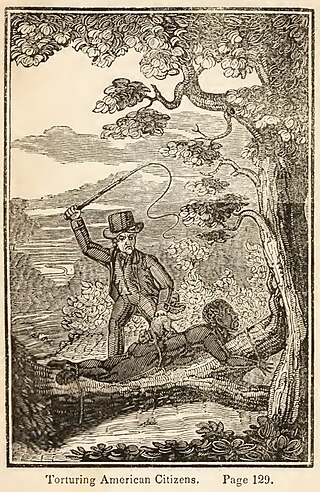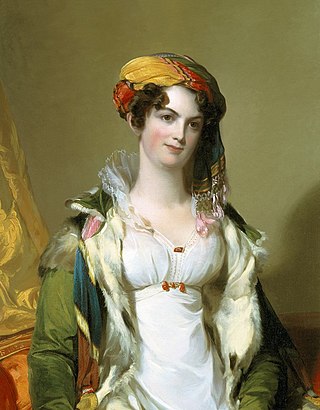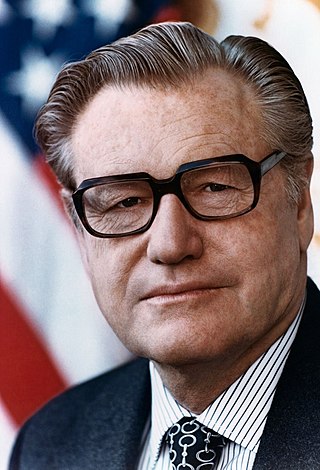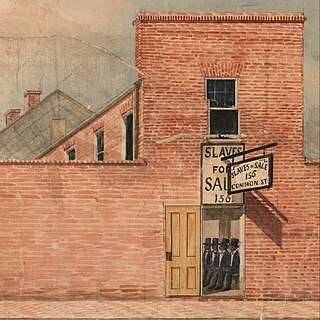
The legal institution of human chattel slavery, comprising the enslavement primarily of Africans and African Americans, was prevalent in the United States of America from its founding in 1776 until 1865, predominantly in the South. Slavery was established throughout European colonization in the Americas. From 1526, during the early colonial period, it was practiced in what became Britain's colonies, including the Thirteen Colonies that formed the United States. Under the law, an enslaved person was treated as property that could be bought, sold, or given away. Slavery lasted in about half of U.S. states until abolition in 1865, and issues concerning slavery seeped into every aspect of national politics, economics, and social custom. In the decades after the end of Reconstruction in 1877, many of slavery's economic and social functions were continued through segregation, sharecropping, and convict leasing.

William Holmes McGuffey was an American college professor and president who is best known for writing the McGuffey Readers, the first widely used series of elementary school-level textbooks. More than 120 million copies of McGuffey Readers were sold between 1836 and 1960, placing its sales in a category with the Bible and Webster's Dictionary.

St. Andrew's Hall was a public building in Charleston, South Carolina, on Broad Street. The hall served as headquarters for the St. Andrew's Society of Charleston, South Carolina. It was also an important part of the social life of upper-class Charlestonians. It was used for balls, banquets, concerts, and meetings of organizations like the South Carolina Jockey Club and the St. Cecilia Society. The hall could also be used for lodging, and both President James Monroe and General Marquis de Lafayette stayed there.

John Wesley Blassingame was an American historian and pioneer in the study of slavery in the United States. He was the former chairman of the African-American studies program at Yale University. The achievements for which he is best remembered include his editorship of the papers of Frederick Douglass, abolitionist and author.
Thomas Jefferson, the third president of the United States, owned more than 600 slaves during his adult life. Jefferson freed two slaves while he lived, and five others were freed after his death, including two of his children from his relationship with his slave Sally Hemings. His other two children with Hemings were allowed to escape without pursuit. After his death, the rest of the slaves were sold to pay off his estate's debts.

In the United States, abolitionism, the movement that sought to end slavery in the country, was active from the colonial era until the American Civil War, the end of which brought about the abolition of American slavery, except as punishment for a crime, through the Thirteenth Amendment to the United States Constitution.

The history of the University of Virginia opens with its conception by Thomas Jefferson at the beginning of the early 19th century. The university was chartered in 1819, and classes commenced in 1825.
Manisha Sinha is an Indian-born American historian, and the Draper Chair in American History at the University of Connecticut. She is the author of The Slave's Cause: A History of Abolition (2016), which won the Frederick Douglass Book Prize.

The planter class was a racial and socioeconomic caste which emerged in the Americas during European colonization in the early modern period. Members of the caste, most of whom were settlers of European descent, consisted of individuals who owned or were financially connected to plantations, large-scale farms devoted to the production of cash crops in high demand across Euro-American markets. These plantations were operated by the forced labour of slaves and indentured servants and typically existed in tropical climates, where the soil was fertile enough to handle the intensity of plantation agriculture. Cash crops produced on plantations owned by the planter class included tobacco, sugarcane, cotton, indigo, coffee, tea, cocoa, sisal, oil seeds, oil palms, hemp, rubber trees, and fruits. In North America, the planter class formed part of the American gentry.

The Memorial to Enslaved Laborers is a memorial in honor of those enslaved African Americans who built and worked at the University of Virginia, in Charlottesville, Virginia.

James Henry Ladson was an American politician, wealthy plantation owner from Charles Town and officer of the American Revolution. He served as the Lieutenant Governor of South Carolina from 1792 to 1794, and was a member of the South Carolina state Senate from 1800 to 1804.
James Henry Ladson (1795–1868) was an American planter and businessman from Charleston, South Carolina. He was the owner of James H. Ladson & Co., a major Charleston firm that was active in the rice and cotton business, and owned over 200 slaves. He was also the Danish Consul in South Carolina, a director of the State Bank and held numerous other business, church and civic offices. James H. Ladson was a strong proponent of slavery and especially the use of religion to maintain discipline among the slaves. He and other members of the Charleston planter and merchant elite played a key role in launching the American Civil War. Among Ladson's descendants is Ursula von der Leyen, who briefly lived under the alias Rose Ladson.

Sarah Reeve Ladson (1790-1866) was an American socialite, arts patron, and style icon. Born into a prominent Charleston family, she was an influential member of the South Carolinian planter class. She was regarded as one of the most fashionable American women of her time and was the subject of various portraits and sculptures.

Slavery as a positive good in the United States was the prevailing view of Southern politicians and intellectuals just before the American Civil War, as opposed to seeing it as a crime against humanity or a necessary evil. They defended the legal enslavement of people for their labor as a benevolent, paternalistic institution with social and economic benefits, an important bulwark of civilization, and a divine institution similar or superior to the free labor in the North.

The President of Stony Brook University serves as the university's Chief Executive Officer. Stony Brook's President, in addition to his or her duties to the university's many academic programs, also oversees the Stony Brook University Hospital with its five health science programs and 120 community-based service centers. The President additionally plays an integral role in the economic development of Long Island, New York through Stony Brook's capacity as co-manager of the Brookhaven National Laboratory.
What will be required is a new attitude toward public higher education, a new state of mind, a new desire to put some real meaning into the motto inscribed in the seal of the State University of New York which says “Let each become all he is capable of being."

Isabella Gibbons was an enslaved woman serving as a cook at the University of Virginia, in Charlottesville, Virginia. After she was freed in 1865 she became a teacher.

William Gibbons, was a formerly enslaved servant, who became a highly successful Baptist minister in Charlottesville and Washington, D.C. He was married to Isabella Gibbons.

This is a bibliography of works regarding the internal or domestic slave trade in the United States (1775–1865, with a measurable increase in activity after 1808, following the Act Prohibiting Importation of Slaves).

Elihu Creswell was an "extensive negro trader" of antebellum Louisiana, United States. Raised in an elite family in the South Carolina Upcountry, Creswell eventually moved to New Orleans, where he specialized in "acclimated" slaves, meaning people who had spent most of their lives enslaved in the Mississippi River basin so they were more likely to have acquired immunity to the region's endemic contagious diseases. This gave him a market niche distinct from many of his competitors, who typically imported slaves from Chesapeake region of the Upper South, or from border states as far as west as Missouri. Unique among slave traders, Creswell's will provided for the manumission of his slaves and moreover provided for their transportation to "the free United States of America." His mother, the other major beneficiary of his will, contested this provision. The legal documentation of the case and the "succession of Elihu Creswell" is a valuable primary source on the slave trade in New Orleans and the history of slavery in Louisiana. A judge ultimately rejected Sarah Hunter Creswell's petition and in 1853 when the steamer Cherokee departed New Orleans, among the passengers aboard were 51 free people of color bound for New York.

















